Publications
Journal der Künste 23
Published three times a year (German/English), available free of charge
ISSN (Print EN) 2627-2490
not yet published
The first issue of Journal der Künste under the presidency of Manos Tsangaris and Anh-Linh Ngo focuses on artistic freedom. Texts by Lena Gorelik, Ralf Michaels, Carsten Wurm and others as well as a conversation with Kristóf Kelemen and Gergely Nagy from Hungary address the defence of artistic autonomy from various perspectives. Further contributions provide insights into the genesis of the current exhibitions and the work of the archive.
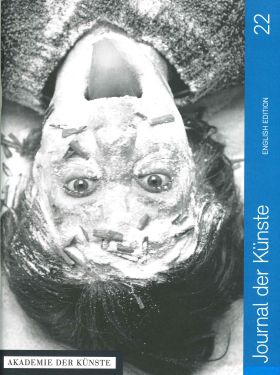
Journal der Künste 22
Published three times a year (German/English), available free of charge
ISSN (Print EN) 2627-2490
The Journal der Künste, issue 22, bids farewell to Jeanine Meerapfel and Kathrin Röggla, the Akademie’s former president and vice-president. It explores the possibility of utopias with Matěj Spurný, Eva von Redecker and Iris ter Schiphorst and the political shift to the right in Germany with Thomas Krüger, Christina Clemm and Holger Bergmann. The 2023 Kollwitz Prize recipient, Sandra Vásquez de la Horra, shows works from her oeuvre; and a Carte blanche designed by Wolfgang Tillmans is featured. The archive includes the stories behind a photomontage by István Szabó and newly acquired drawings by George Grosz, as well as insights into Jürgen Flimm’s director’s workshop.
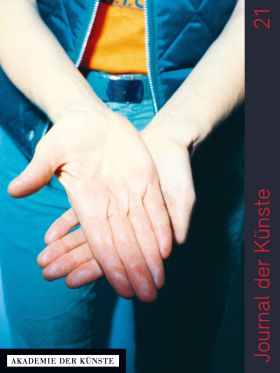
Journal der Künste 21
Published three times a year (German/English), out of print
ISSN (Print EN) 2627-2490
The 21st issue with a new design focuses on questions of sustainability: with texts and photo series on “The Great Repair” by Anh-Linh Ngo, Zara Pfeifer and Mierle Laderman Ukeles, among others, and literary contributions by Ulrike Draesner and Cécile Wajsbrot. Also: conversations with Luc Tuymans and Gundula Schulze Eldowy, short essays by Anna Hetzer, Moshtari Hilal et. al. as well as news from the Archives.
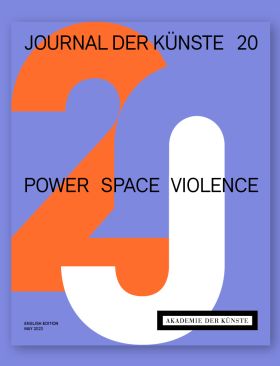
Journal der Künste 20
Published three times a year (German/English), available free of charge
ISSN (Print EN) 2627-2490
Accompanying the current exhibition, the 20th issue focuses on the context of power, space, and violence. Other topics include exile, artistic freedom, the broadcasting crisis, and the role of the arts in the revolutionary process in Iran. With contributions by and with Regina Stephan, Monica Bonvicini, Joanna Piotrowska, Eszter Salamon, Philipp Krüpe , Mina Keshavarz, Tanasgol Sabbagh, Matthias Lilienthal, Meron Mendel, Senthuran Varatharajah, Dominic Graf, Gerhart Baum, Sibylle Hoimann and Annett Gröschner, among others.
To order the printed version: info@adk.de
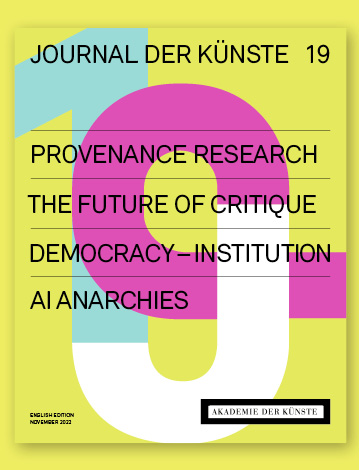
Journal der Künste 19
Published three times a year (German/English), available free of charge
ISSN (Print EN) 2627-2490
The new issue looks at the crisis of public broadcasting as an instrument of democracy, at how art deals with the societal challenges of artificial intelligence, and at the changing role of (art) criticism. Other focal points: the current archive exhibition “Spurensicherung,” photographs by Nan Goldin and Aleš Šteger on artistic freedom in Europe.
To order the print edition: info@adk.de
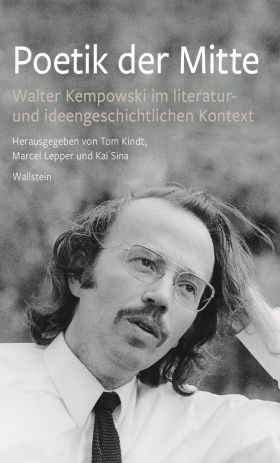
Poetik der Mitte. Walter Kempowski im literatur- und ideengeschichtlichen Kontext
Tom Kindt, Marcel Lepper und Kai Sina
Wallstein Verlag, Göttingen 2022
German, 232 pp.,
16 ill.
ISBN 978-3-8353-3846-3
Best.-Nr. 4040
€ 26,90
The monumental text collages of Walter Kempowski seek the political and aesthetic middle ground. In them, he brings together narrative tradition and avant-garde. The contributors investigate the literary and historical constellations of the great prose writer. The volume was produced in cooperation with the Akademie der Künste, which preserves the extensive Kempowski archive.
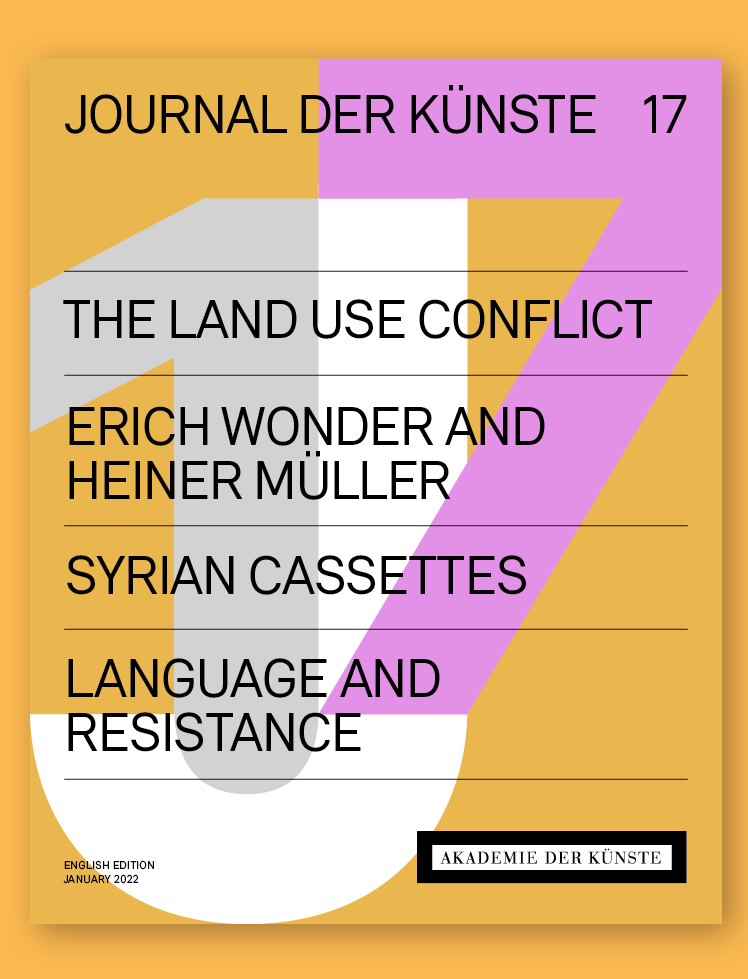
Journal der Künste 17
Published three times a year (German/English), available free of charge ISSN (Print EN) 2627-2490
In addition to an essay by Wilfried Wang on the question of land use, Stephan Suschke’s presentation of the new exhibition on Erich Wonder’s stage designs for Heiner Müller and poems by Meena Kandasamy, dialogues are at the centre of the 17th issue: Kathrin Röggla talks to writer Mohamed Mbougar Sarr about language and resistance, a roundtable discusses the legacy of Paul and Eslanda Robeson, Mark Gergis talks about cassette kiosks in Damascus and his collection of Syrian music in an interview. The focus is also on the opening of the Roger Willemsen Archive and a photo series by Ute Mahler and Werner Mahler. The Carte Blanche goes to JUNGE AKADEMIE fellow and visual artist Sasha Kurmaz.
To order the print edition: info@adk.de
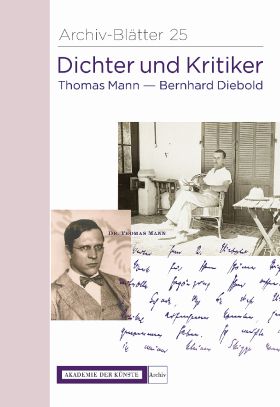
Archiv-Blätter 25
Dichter und Kritiker.
Thomas Mann – Bernhard Diebold
Dirk Heißerer on behalf of the Akademie der Künste (ed.)
Akademie der Künste, Berlin 2019
German, 216 pp.,
117 ill.
ISBN 978-3-88331-234-7
Best.-Nr. 4038
€ 18
Zwischen 1917 und 1940 wechselte Thomas Mann ausführliche Briefe mit Bernhard Diebold, einem der entscheidenden Literatur- und Theaterkritiker der Weimarer Republik. Dirk Heißerer hat die bislang unbekannte Korrespondenz aus dem Archiv ediert und kommentiert. Der Band bietet eine faszinierende Rekonstruktion, angereichert durch Bernhard Diebolds Besprechungen – vom Zauberberg bis zu den Josephs-Romanen.
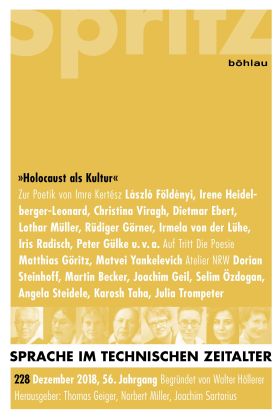
Holocaust als Kultur
Zur Poetik von Imre Kertész
Sprache im technischen Zeitalter, Heft 228, December 2018
German, 236 pp., 15 ill.
ISSN 0038-8475
€ 14
Under the title "Holocaust as Culture: On the Poetics of Imre Kertész", in April 2018, writers, literary scholars, critics, translators and companions of the winner of the Nobel Prize for Literature, who passed away in 2016, met at the first international conference on Imre Kertész, who also was a member of the Akademie. The lectures by Dietmar Ebert, Peter Gülke, Irene Heidelberger-Leonard, Katalin Madácsi-Laube, Lothar Müller, Iris Radisch and Christina Viragh, among others, are documented in this publication. Preface by Irene Heidelberger-Leonard, Jörg Feßmann und Ingo Schulze.
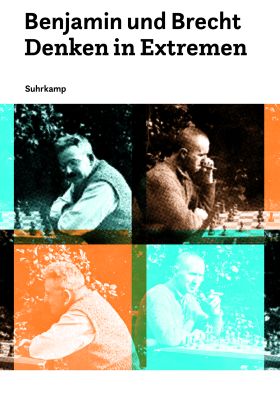
Benjamin und Brecht.
Denken in Extremen
[Thinking in Extremes]
Erdmut Wizisla on behalf of the Akademie der Künste (ed.)
Akademie der Künste / Suhrkamp, Berlin 2017
German, 284 pp., 122 ill.
ISBN 978-3-518-42083-6
Best.-Nr. 4032
€ 32
Communication between the well-known Svendborg chess partners recalls the royal game: It employed tiring tactics, surprise attacks, retreat, strategic partnership, checkmate – and a new game. The essays and artistic commentary in the book turn the spotlight on an extraordinary constellation, in which Benjamin and Brecht appear as contemporaries in a century of extremes. They developed models for art, for politics, thought processes and for life itself; sometimes "extreme on a trial basis" and sometimes playful. With texts by Minou Arjomand, Broomberg & Chanarin, Zoe Beloff, Durs Grünbein, Barbara Hahn, Alexander Kluge, Mark Lammert, Bernd-Peter Lange, Burkhardt Lindner, Thomas Martin, Ursula Marx, Frank-M. Raddatz, Jan Philipp Reemtsma, Kristin Schulz, Marcus Steinweg, Steffen Thiemann, B. K. Tragelehn, Edmund de Waal and Erdmut Wizisla.
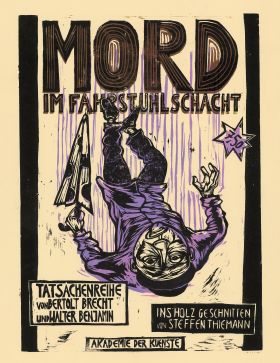
Mord im Fahrstuhlschacht
Tatsachenreihe by Bertolt Brecht and Walter Benjamin
Woodcuts by Steffen Thiemann
Graphic Novel
Akademie der Künste, Berlin 2017
German, 36 pp., 33 ill.
ISBN 978-3-88331-223-1
Best.-Nr. 4033
€ 7,50
Benjamin and Brecht decided to write a crime novel in autumn 1933. Steffen Thiemann has turned Brecht’s plot into woodcuts and set down Benjamin’s ideas as footnotes. It’s a story about blackmail that ends fatally. With texts by Steffen Thiemann and Erdmut Wizisla.
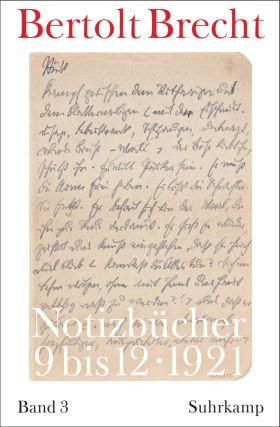
Bertolt Brecht, Notizbücher, Band 3: 1921
Martin Kölbel and Peter Villwock on behalf of the Akademie der Künste (eds.)
Akademie der Künste / Suhrkamp, Berlin 2017
German, 706 pp., 268 ill.
ISBN 978-3-518-42596-1
€ 58
Volume 3 of this notebook edition faithfully publishes four notebooks from 1921 for the first time. The focus is on Brecht’s third major work for the theatre, Im Dickicht (In the Jungle). In addition, numerous unknown drafts, notes about readings and private debates can also be found. The editors expand on Brecht’s entries in detailed text commentaries, while providing new knowledge about his work and biography.